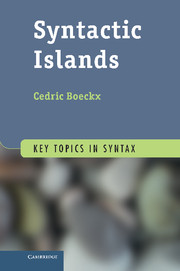Book contents
- Frontmatter
- Contents
- Preface
- Acknowledgements
- 1 Never such innocence again
- 2 What is really all just a mirage?
- 3 Why the ultimate solution is unlikely to be purely syntactic
- 4 Priority to the interfaces
- 5 A tribute to Ross
- Appendix On the robustness of the freezing-effect of chains
- Suggestions for further study and recommended readings
- Glossary
- Notes
- References
- Index
2 - What is really all just a mirage?
Published online by Cambridge University Press: 05 August 2012
- Frontmatter
- Contents
- Preface
- Acknowledgements
- 1 Never such innocence again
- 2 What is really all just a mirage?
- 3 Why the ultimate solution is unlikely to be purely syntactic
- 4 Priority to the interfaces
- 5 A tribute to Ross
- Appendix On the robustness of the freezing-effect of chains
- Suggestions for further study and recommended readings
- Glossary
- Notes
- References
- Index
Summary
THE BASIC IDEA BEHIND THE ALTERNATIVE
The position – or I should say, positions, for there is more than one way of articulating the perspective at the heart of this chapter – that I will focus on here exists in both a radical and a more conservative version. Usually, the more radical version – ‘there are no islands in syntax!’ – is presented in the abstract and introductory sections of the relevant article, presumably to catch the reader's attention. But this is such a radical version that it often proves too difficult to maintain, so much so that towards the end of the more careful papers, it is claimed that at least some island effects, though by no means all such effects, could be explained in a non-syntactic fashion.
As I already mentioned in the concluding part of the previous chapter, the plausibility of such a view, which is often called ‘reductionist,’ stems from the fact that as data regarding island phenomena accumulated, and problematic cases for the proposed constraints came to light, some theoreticians came to the conclusion that the data set used to motivate island constraints was, in the words of Hofmeister and Sag (2010), “slippery at best.” Gradually, counterexamples to nearly every structure-based island constraint ever proposed in the literature came to light, and linguists began to wonder whether there was anything left of Ross's and Chomsky's original conditions, or modern refinements of them. Already back in the 1970s, a few linguists suggested that island effects were not effects of syntax (or grammar) proper, but rather, the unacceptability of certain extractions was due to processing factors, or discourse factors, or semantic factors, or pragmatic factors, or a combination of all of these, but crucially not due to syntactic factors.
- Type
- Chapter
- Information
- Syntactic Islands , pp. 26 - 53Publisher: Cambridge University PressPrint publication year: 2012

